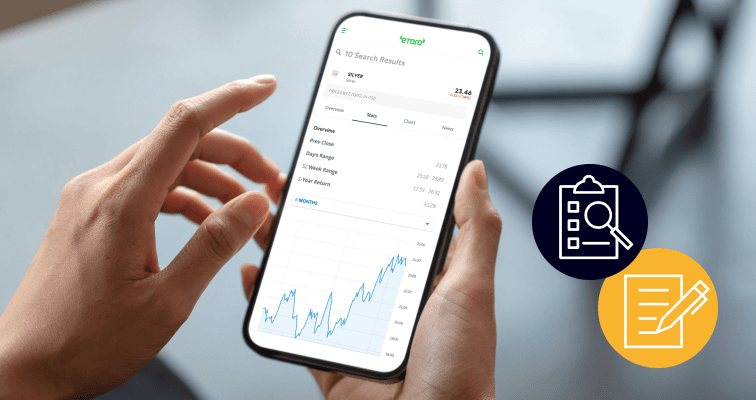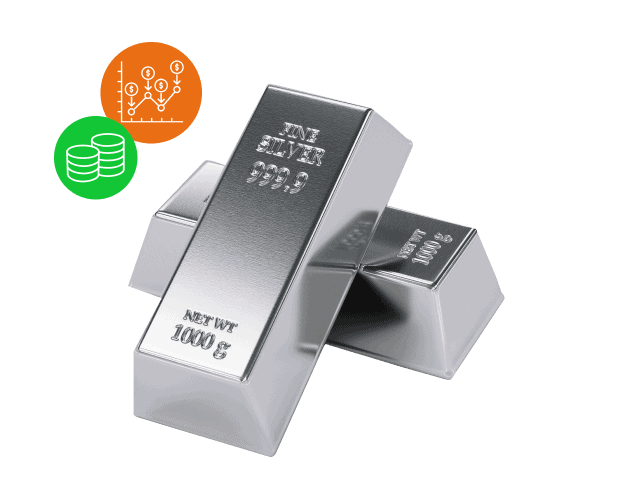Ready to take the plunge and start investing in silver? Find out more about its potential risks and benefits, how it compares with gold and the investment methods you can explore.
There are many different ways to invest, ranging from a portfolio of physical properties to global stocks. But there are also opportunities to invest in commodities such as gold and silver.
But is silver an asset that could help you achieve your financial goals? Learn more about investing in silver and find out if it is right for your portfolio.
How to invest in silver
There are many different ways to start investing in silver, including both indirect and direct methods. Explore some of the most common ways people invest in silver below.
Stocks
If you are looking for indirect exposure to the silver industry, you may opt to invest in silver mining stocks. The value of these stocks will typically fluctuate alongside the value of silver, but may also be affected by company performance and other external factors.
ETFs
Offering broader yet less direct exposure than standard silver stocks, silver exchange-traded funds (ETFs) allow you to track the movement of a variety of assets, from stocks to the physical commodity.
Tip: ETFs can be bought and sold like stocks, providing some additional flexibility for investors.
Physical assets
If you prefer the satisfaction of physically owning the commodities you invest in, you may opt to purchase silver bullion, coins or jewellery. It is important to only use reputable dealers and to compare the current spot rate before purchasing.

Invest in gold or silver?
Considering adding commodities to your portfolio? Gold and silver are two popular precious metals. But what sets them apart? And what should you consider before investing? View the table below to explore the key differences between silver and gold as investments.
| Gold | Silver |
|---|---|
| Generally less volatile than silver | Tends to be more volatile than gold |
| Often better suited to long-term investment | May be better suited to short-term investment |
| Tends to have a high spot price | Is generally cheaper to invest in than gold |
| May be less affected by wider economic factors | Often fluctuates in value based on wider economic factors |
| May be used as a safe-haven investment or hedge during times of economic uncertainty | May be used as a safe-haven investment or hedge during times of economic uncertainty |
| Smaller quantities of gold are mined annually | Greater quantities of silver are mined annually |
It is important to recognise the marked differences between investing in gold and investing in silver. Silver tends to be far more volatile than gold, as its value is closely tied to the industrial supply and demand for it, particularly as part of innovative technologies.
Both assets are, however, considered to be safe-haven assets, generally retaining or increasing in value during periods of market volatility.
Tip: The best option for your portfolio depends on your risk tolerance and your personal financial goals.
How to trade silver
Looking to trade silver? There are several methods to choose from. Some of the most popular include:
Contracts for difference (CFDs)
Traders wanting to speculate on the price movements of silver may opt to make use of CFDs. Without having to own the underlying asset, traders can enter into an agreement with a broker, speculating on the difference in the price of silver between the time the contract opens and the time it closes.
Those wanting to gain exposure to a larger position may do so using leverage, but it is important to note that while traders may be able to make a profit with CFDs, the losses can be just as great, or more, if the price moves against your position.
Futures
Futures are essentially a contract between two parties agreeing to buy or sell an asset at a specified price in the future. Some investors choose to use futures contracts when investing in silver, allowing them to wager on the price of silver, whether it is rising or falling.
Options
Traders must buy or sell once a futures contract expires, but options contracts, on the other hand, provide investors with an opportunity, not an obligation, to buy or sell silver at a set price at a later date.
Spot prices
While futures allow you to speculate on the price of silver at a later date, silver spot prices allow you to invest in the commodity “on the spot” and at its current price. Investors may use this method to gain exposure to the silver market without the need to own the physical commodity.

What impacts the price of silver?
There are several factors that may impact the price of silver. Some of the key factors include:
- Supply and demand. If demand for silver increases, so, too, does its value. If demand wanes or there is an oversupply of silver, its price will typically decrease.
- The state of the economy. Much like gold, investors may turn to silver as a hedge against inflation and other types of economic volatility. This may increase demand and, subsequently, the price of silver. When the economy thrives, demand may lessen.
- Currency movements. Since silver is denominated in US dollars, when the currency weakens, so, too, does its value. If the US dollar strengthens, the value of silver is likely to rise too.
- Demand for safe-haven investments. In periods of economic volatility, investors may turn to silver as a safe-haven investment. Once the economy recovers, however, investor attention may turn their attention to other types of assets.
Risks of investing in silver
When considering any form of investment, it is important to weigh up the pros and cons to assess if it is the right fit for your portfolio.
Some risks of investing in silver to consider include:
Silver prices can fluctuate
Since the performance of silver can be influenced by the wider economy and other factors, its value does tend to fluctuate. As such, any gains and losses can be amplified.
Silver does not generate income for investors
Unlike some stocks and other assets, silver, as a tangible commodity, does not generate any additional income for investors. For those looking for a source of additional income, they may need to consider investing in silver mining stocks that issue dividends or other alternatives.
Silver may have a high opportunity cost
Although silver may appreciate in value over time and be used as a hedge for riskier investments, investing in silver may tie up capital that could otherwise be used for investments offering higher returns or other attractive, low-risk opportunities.

Benefits of investing in silver
There are a number of ways to invest in commodities, as well as several risks attached to silver specifically. With this in mind, is silver a good investment?
Silver may appreciate in value
Although its value does fluctuate, silver has historically appreciated in value over time, sometimes outperforming stocks and other asset classes.
Demand for silver may continue to increase
There is demand for silver across a variety of industries, and this demand may continue to increase. This is because it has many useful properties — shipping and transport companies want it for its electrical conductivity (e.g., for RFID tags), while medical companies leverage its antibacterial properties.
Silver may provide diversification
Since there is a low correlation between the performance of other markets and the performance of silver, investing in silver may be a good opportunity to diversify your portfolio and help to manage your investment risk.
Final thoughts
While past success is no indicator of future performance, silver may be a worthy addition to many investors’ portfolios. It always depends on your risk tolerance, the amount of research you put into investing in silver, and whether it aligns with your overall investment strategy.
Build your knowledge of commodities with the eToro Academy.
Quiz
FAQs
- Is silver a good option for new investors?
-
Since silver is far cheaper than gold, it tends to be more accessible and affordable for new investors. It is, however, important to consider your personal investment goals, risk tolerance and the makeup of your wider portfolio before investing.
- Why is silver a volatile commodity?
-
The price of silver is not only driven by speculation, but also by supply and demand. As it has lower market liquidity compared to larger commodities such as gold, its price is more likely to fluctuate.
- What makes silver a good investment?
-
That depends on the individual and whether it is appropriate for your investment portfolio. However, many investors appreciate that silver has an intrinsic value and is, therefore, traditionally steady in the face of economic and political disruption, as well as other external factors such as inflation.
This information is for educational purposes only and should not be taken as investment advice, personal recommendation, or an offer of, or solicitation to, buy or sell any financial instruments.
This material has been prepared without regard to any particular investment objectives or financial situation and has not been prepared in accordance with the legal and regulatory requirements to promote independent research. Not all of the financial instruments and services referred to are offered by eToro and any references to past performance of a financial instrument, index, or a packaged investment product are not, and should not be taken as, a reliable indicator of future results.
eToro makes no representation and assumes no liability as to the accuracy or completeness of the content of this guide. Make sure you understand the risks involved in trading before committing any capital. Never risk more than you are prepared to lose.


